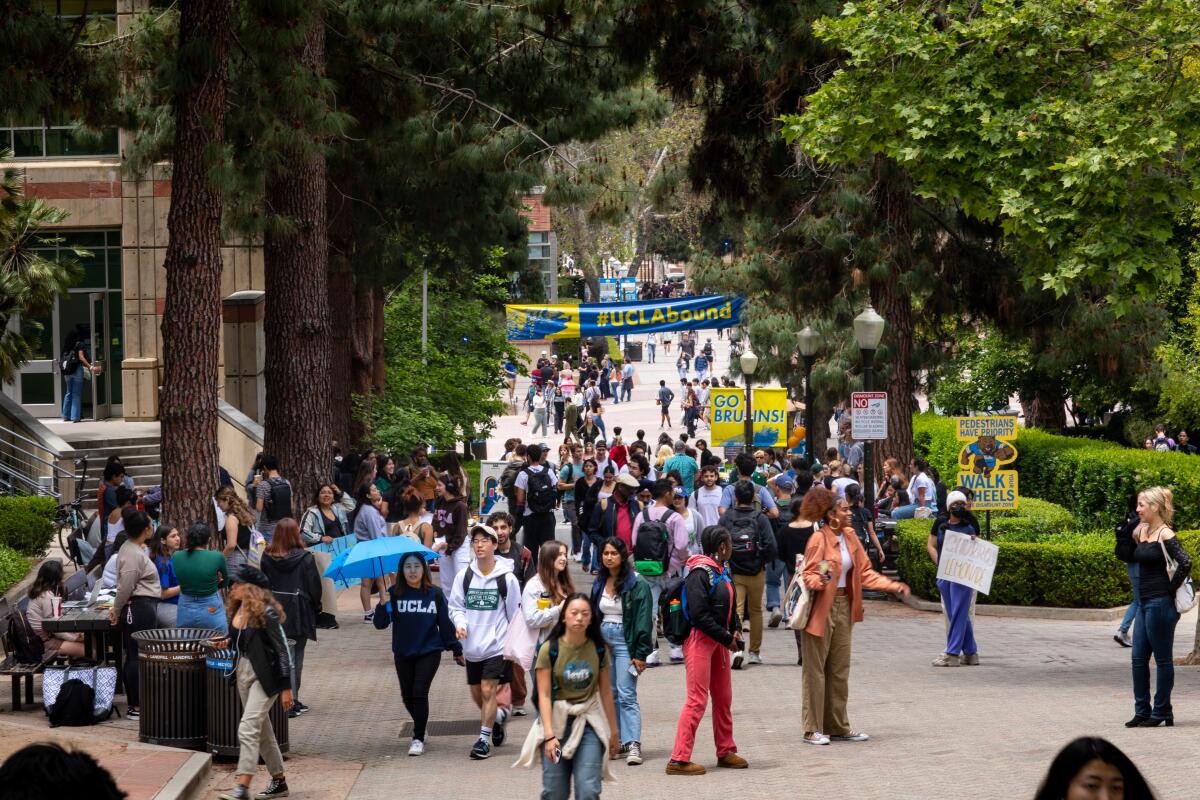Despite California exodus, the well-off and well-educated still flock here. Will they stay?

- Share via
Thomas Kowal knew living expenses in Los Angeles would be steep. But he was surprised at how steep.
Kowal, 25, had lived on the East Coast for most of his life, but he applied to UCLA for a toxicology PhD program because, he said, he wanted a change of pace and scenery, and he hoped to earn the kind of salary after graduation that would let him afford the California lifestyle.
“When I came here for interviews for a couple days, I really didn’t notice things like gas prices, sales prices that you do notice once you’re on the hook for it,” he said. “Certainly you can see some red flags, and I was prompted to ignore that because I knew living here was my main interest.”
Despite California’s high cost of living, the state has continued to attract more educated and well-paid residents.
Subscribers get early access to this story
We’re offering L.A. Times subscribers first access to our best journalism. Thank you for your support.
New census data discount the notion that California’s housing and affordability crisis is pushing away educated residents, resulting in a so-called “brain drain.”
The numbers suggest California’s strong economy in such sectors as technology, medicine and entertainment, as well as its admired higher-education network, continues to draw people.
But some factors — notably high housing prices — could still send people like Kowal out of California to places where their incomes and degrees buy them more.
In 2022, almost two-thirds of those who moved to California from another state had a bachelor’s degree or higher, as did more than half who moved from other countries, according to census data.
Though the state’s population declined between 2021 and 2022, the number of people with a bachelor’s degree rose by 1.6% and the number of those with a graduate degree rose 2.6%, the data show.
The number of Californians over age 25 with less than a college degree shrank by 1.4% in the same span.
New transplants from other states are skewed toward higher education, with nearly as many graduate or professional degree holders — 91,000 — coming from other parts of the U.S. as those with bachelor’s degrees — 105,000.
Those who arrive from other countries also are disproportionately educated, though there are more people with lower incomes and education in that group. Of those who arrived in California from abroad, 28% were below the poverty line in 2022, compared with 12% statewide in 2021, according to census data.
The California exodus has slowed but continued since 2020, with the state’s population declining by 0.1% between July 2022 and July 2023, according to new Census Bureau data.
Over the last five years, California has experienced a net loss of college graduates in the state’s exchanges with other states, said Hans Johnson, a senior fellow with the Public Policy Institute of California, describing a “reversal of the long-standing pattern.”
Like the population drops seen in the California exodus, the loss of educated residents “has abated quite a bit,” he said. At its highest, the peak was “a pretty notable number” of almost 90,000 more college grads leaving than arriving. In 2022, the outflow decreased to a net loss of just over 30,000.
The loss of educated workers led to discussion of a possible “brain drain” amid the state’s broader population woes. But Johnson said that after some pandemic disruption, the state’s previous pattern of attracting educated workers is starting to re-emerge.
“California has long tended to attract young college graduates” in their early 20s “who are just starting” their careers, he said, and “that group is net positive again.”
War in the Mideast has sharply divided California voters along lines of age and ideology. President Biden is caught in the middle, opposed by both left and right for his response to the fighting.
The state economy has “grown most rapidly for highly educated workers” and rewarded those workers with high wages, he said. “They’re coming knowing that housing is going to be more expensive” but with skills and jobs that allow them to afford it.
This movement counteracts another piece of the population puzzle: the loss of high-income Californians and their tax revenue.
Data from the Internal Revenue Service show that between 2020 and 2021, those who moved from the Golden State to such places as Florida and New Hampshire had far higher incomes than the median Californian.
Educated people who arrive in California and students on their way to higher-paying jobs can help compensate for that deficit, experts said.
Kowal — who grew up in Hadley, Mass., and attended college in Atlanta — is seeing the state’s housing and affordability crisis from the perspective of a student scraping by on a $47,000-a-year PhD stipend.
The only thing that might keep him in California is a $120,000 salaried job after graduating in two or three years, he said. And even then, that might not be enough.
“I think between gas prices, taxes, increased food prices and rent, everyone has got a hand in your wallet,” he said. “The experience is not worth all that cost, in my opinion. So that’s why I would have such a high asking price to stay out here.”
Still, Kowal said, he has many peers — especially those from California — who end up staying here.
He said he would consider moving to San Diego, which he enjoys visiting when he has free time. But when asked whether he would take a job with the same salary in San Diego or Atlanta, he said, after a long pause, “Yeah, I’d probably go to Atlanta.”
More to Read
Sign up for This Evening's Big Stories
Catch up on the day with the 7 biggest L.A. Times stories in your inbox every weekday evening.
You may occasionally receive promotional content from the Los Angeles Times.














